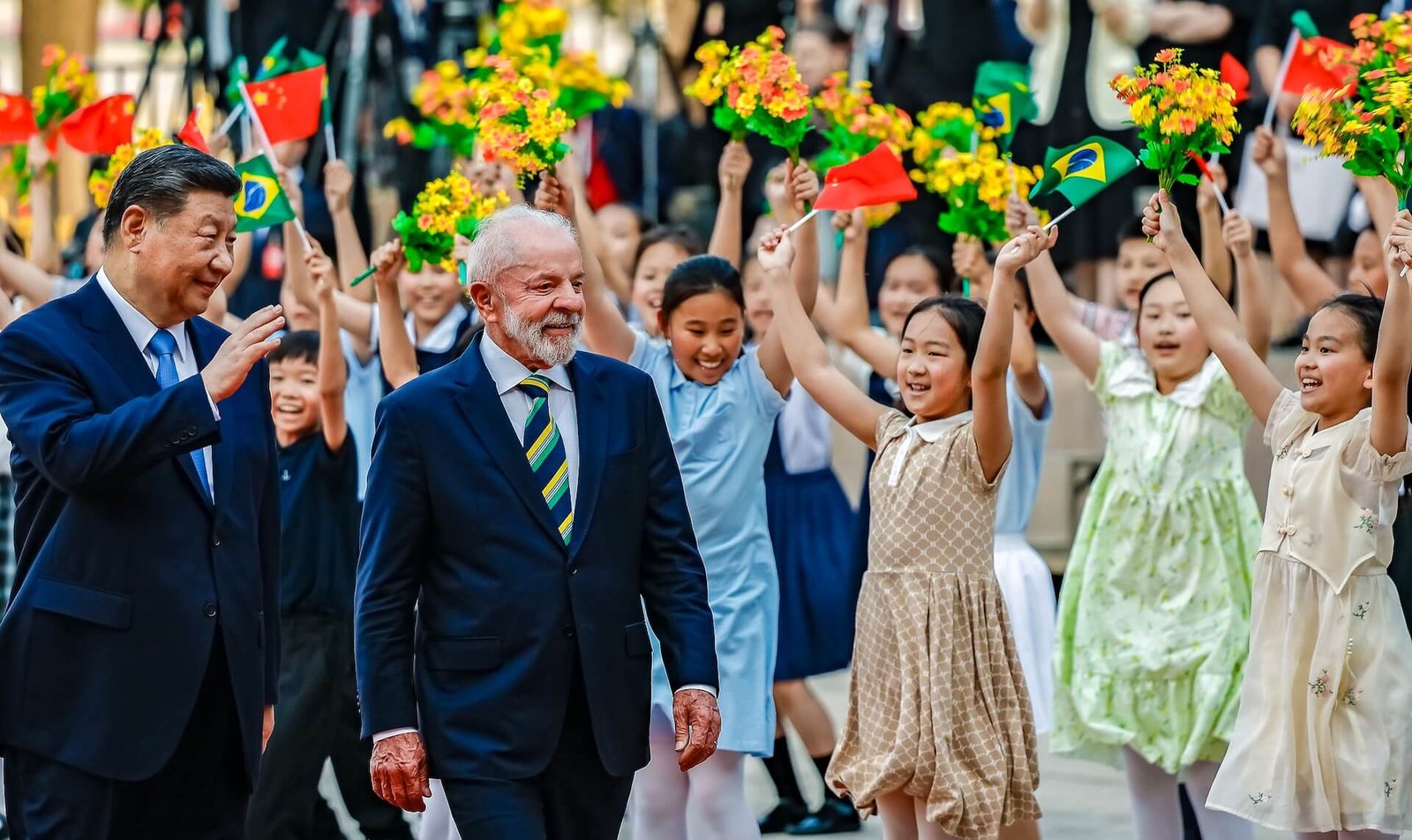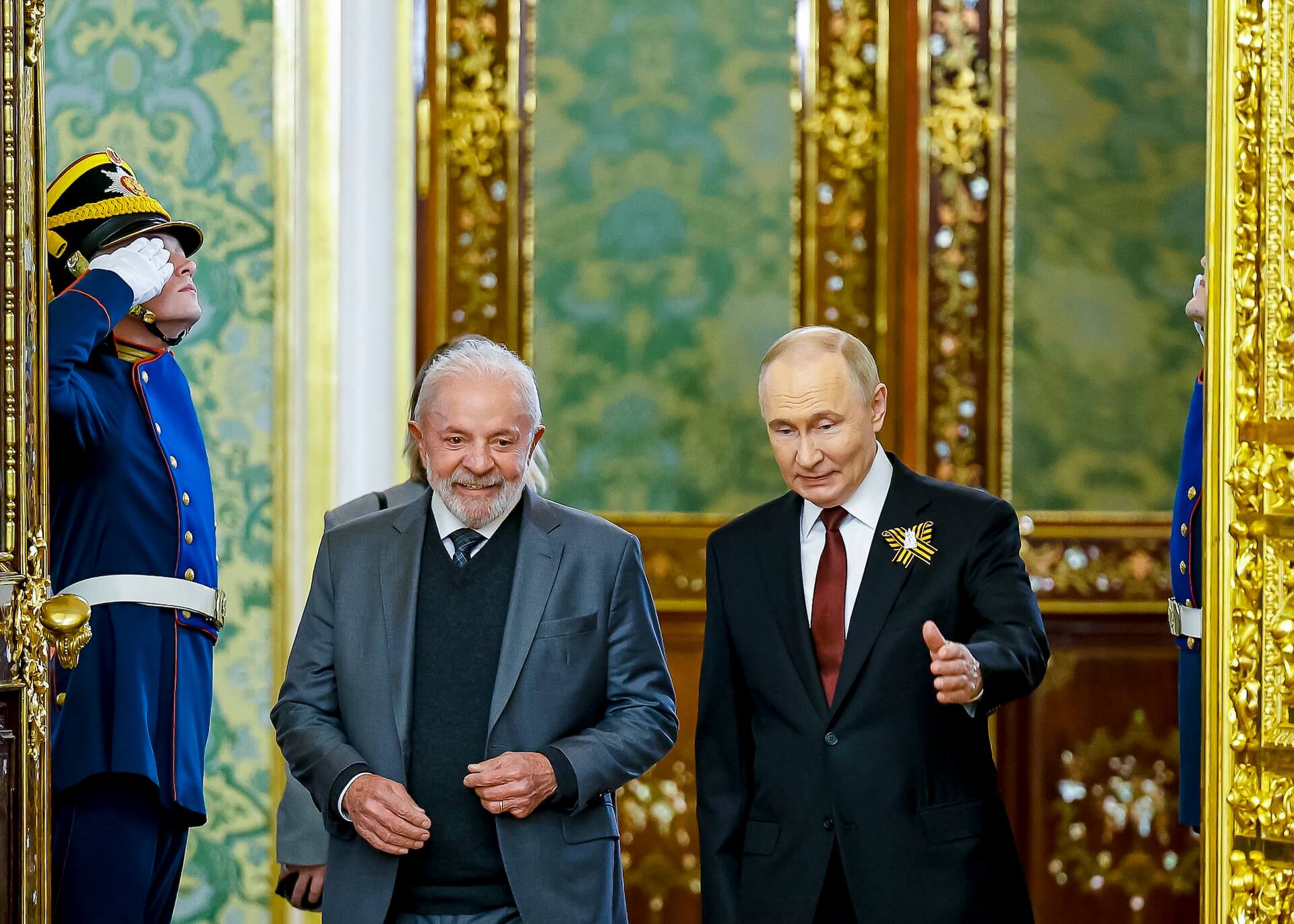In visits to Russia and China, Lula emphasizes the role of BRICS and defends multilateralism and new global governance
During his visits to Russia and China, President Luiz Inácio Lula da Silva highlighted BRICS as the driving force of the Global South, advocated for a multipolar world order, signed strategic partnerships, and promoted multilateralism and sustainable development.

By Leandro Molina / leandro.molina@presidencia.gov.br
In his meetings with Russian and Chinese leaders, Lula reinforced Brasil's role as a central actor in strengthening BRICS and advocating for a new international order based on cooperation and the reorganization of global relations among various countries. “Despite the more than 15,000 kilometers that separate us, we have never been closer,” said Lula to Chinese President Xi Jinping, emphasizing BRICS as a key platform for coordinating the Global South and building a more balanced, multipolar order.
Lula’s visit to China—his fourth official trip to the country and the third in the past two years—resulted in significant progress on agreements in the fields of innovation, energy, health, and sustainable development. In Beijing, he strengthened ties with Brasil’s main trade partner by promoting bilateral agreements totaling BRL 27 billion in investments.
The Brazilian president held meetings with executives from major Chinese companies in the energy and defense sectors, leading to strategic announcements. Notable highlights include a USD 1 billion investment by Envision in sustainable aviation fuels (SAF) derived from sugarcane, reinforcing Brasil’s leadership in the energy transition. Additionally, an agreement with Windey Technology and SENAI CIMATEC was signed to establish a research and development center focused on innovation in renewable energy. This document marks a new step in bilateral cooperation on renewable energy and low-carbon technologies.
During the Brasil-China Business Forum, Lula emphasized that the partnership with China goes beyond commercial interests and is crucial in addressing social, environmental, and technological challenges. “It is with China that we will strengthen CELAC—a regional bloc that brings together all independent countries from Latin America and the Caribbean—to promote the region’s political, economic, social, and cultural integration as a space for political collaboration and coordination,” he said, reiterating the bloc’s importance in building new geopolitics of inclusion and solidarity.
Lula reaffirmed Brasil's commitment to multilateralism and highlighted priority areas for cooperation: energy transition, food security, poverty eradication, and technological innovation. “We seek mutually beneficial relationships that respect the sovereignty of peoples and promote social and environmental justice,” he stated.
In addition to advancing the environmental agenda—with a focus on COP30, which will be held in Belém, in the Brazilian state of Pará—the visit to China also yielded significant economic results. Since 2009, China has become Brasil’s largest trade partner. In 2023, bilateral trade reached a record USD 157.5 billion, with a surplus of over USD 51 billion for Brasil. Exports to China surpassed trade with both the United States and the European Union, underscoring the importance of this partnership. Key exports include soybeans, oil, and iron ore, while Brazilian imports from China comprise telecommunications equipment, vessels, and industrial machinery.
From January to April 2025, China remained Brasil’s main commercial partner, accounting for 26.5% of exports and 26.9% of imports. The trade balance was positive, with a surplus of USD 4.39 billion, resulting from USD 28.45 billion in exports (+12.2% compared to 2024) and USD 24.06 billion in imports (+26.1%).
The dynamism of the trade balance became even more evident in the first quarter, with nearly USD 39 billion in trade, according to the Brazilian Ministry of Development, Industry, Trade, and Services’ Statistics on Foreign Trade department (Comex Stat/MDIC).
The Brazilian mission to China also strengthened cooperation in the health sector with the establishment of the Brasil-China Institute for Innovation in Biotechnology and Infectious and Degenerative Diseases. This partnership between Brasil’s Eurofarma and China’s Sinovac is expected to position Brasil as a reference in advanced therapies, directly impacting the autonomy of the Unified Health System (Sistema Único de Saúde/SUS) and generating qualified job opportunities.
In the pharmaceutical sector, another key development was the announcement of BRL 350 million in investments for the production of Active Pharmaceutical Ingredients at new facilities in Rio de Janeiro. This partnership promises to reduce external dependency and ensure greater autonomy for the Unified Health System (SUS).
The Brasil-China Business Forum gathered over 700 business people and authorities, resulting in robust announcements. The automaker GWM will invest BRL 6 billion to expand its operations in Brasil, while the delivery platform Meituan plans to allocate BRL 5 billion to the Brazilian market, with an expected creation of 100,000 indirect jobs. CGN, a Chinese state-owned energy company, will invest BRL 3 billion in a renewable energy hub in Piauí, and Envision will lead the development of the first Net-Zero Industrial Park in Latin America. Additional investments include BRL 3.2 billion from the Mixue beverage network and the acquisition of a copper mine in Alagoas for BRL 2.4 billion.
The visit to China reaffirmed Brasil’s commitment to international cooperation and highlighted BRICS as a key instrument for addressing global challenges such as climate change and inequality. For the Brazilian government, Lula’s presence in China underscores the country’s readiness to lead the new green economy. The Brazilian Chief of Staff, Minister Rui Costa, emphasized that the signed agreements will drive technological development, talent training, and the creation of innovation centers in Brasil, focusing on solar and wind energy as well as energy storage systems—an area still underdeveloped in the country. The delegation also included Minister of Mines and Energy Alexandre Silveira, who stated that the visit strengthens a strategic relationship that has proven vital over the years for the growth and alignment of the interests of both nations.

Dialogues in Russia
Before arriving in Beijing, the Brazilian president visited Russia, where he attended the 80th anniversary commemorations of World War II Victory Day and met with President Vladimir Putin. The visit was marked by discussions on trade, energy, and technology, further strengthening ties with another key BRICS partner.
During the meeting with President Putin, Lula advocated for deepening trade relations between Brasil and Russia. A key focus of the discussions was bilateral trade, which in 2024 reached a historic high of USD 12.4 billion, although it still shows a significant deficit for Brasil: USD 11 billion in imports compared to USD 1.4 billion in exports. Data from January to April 2025 indicate that Russia ranked 41st in Brasil’s export destinations and 5th in imports, accounting for 0.4% and 3.71% of total trade, respectively. The main products exported to Russia included beef, tobacco, poultry, and non-roasted coffee. (Source: Comex Stat / Brazilian Ministry of Finance)
To address this trade imbalance, the Brazilian government aims to diversify commercial exchanges by increasing exports of agricultural commodities such as soybeans, coffee, and beef, while exploring new opportunities in strategic sectors like energy, mining, and technology. “A good trade policy is a two-way street. We buy and sell more or less in the same proportion so that no one is harmed,” said the Brazilian president.
Cooperation on energy
Cooperation on energy was one of the key highlights of the agenda in Moscow. Lula expressed Brasil’s interest in advancing collaboration with Russia in areas such as small-scale nuclear reactors—a strategic solution to ensure long-term energy security—and critical minerals like lithium, cobalt, and rare earths, which are crucial for the energy transition and the high-tech industry.
During an interview in Moscow, the Brazilian president also emphasized that the conflict between Russia and Ukraine was one of the main topics discussed in his conversations with Russian President Vladimir Putin. Along with China, Brasil is part of a group of nations that has formed a coalition of countries willing to assist in the peace negotiations. “I told President Putin that we are ready to help with negotiations, as long as both countries involved are open to our participation,” he added.
In both Russia and China, through signed agreements and advancing dialogues in critical areas for national development, the Brazilian government demonstrated its intent to achieve equilibrium in its trade balance while ensuring that the country has an active voice in shaping a world with fewer conflicts and more cooperation. At a time when geopolitical tensions and trade wars threaten international stability, Brasil’s commitment to BRICS is driven by a focus on dialogue and the diversification of alliances, both as a political choice and a strategic necessity for multilateralism.